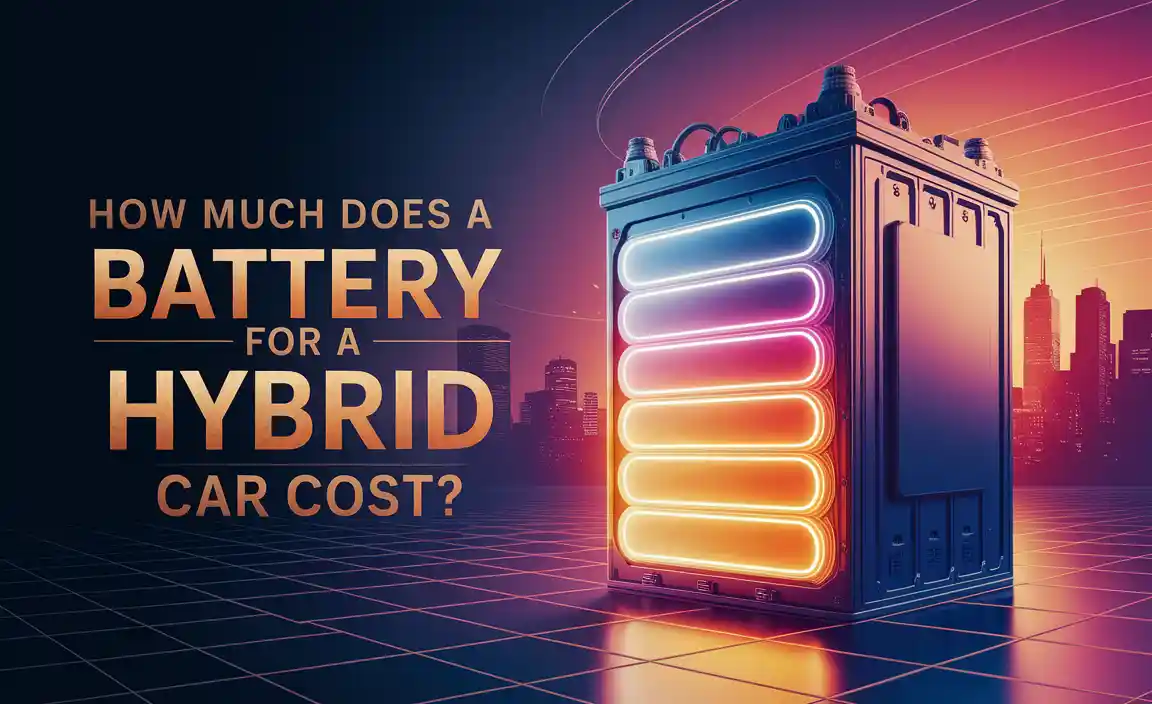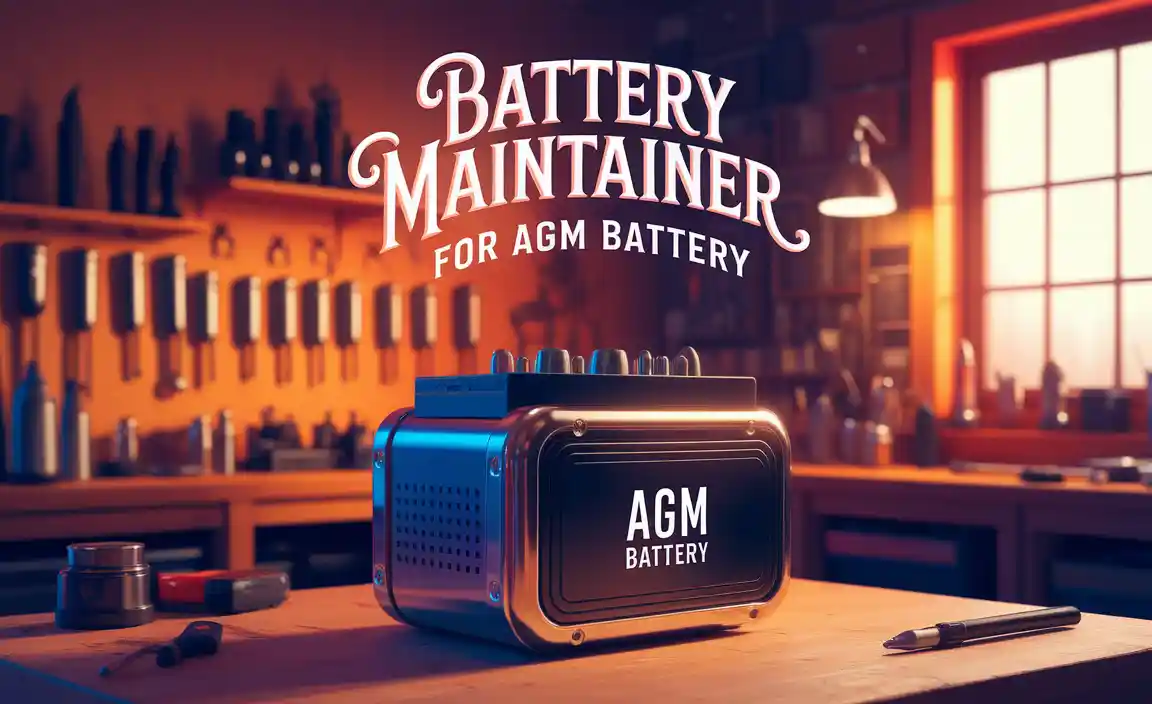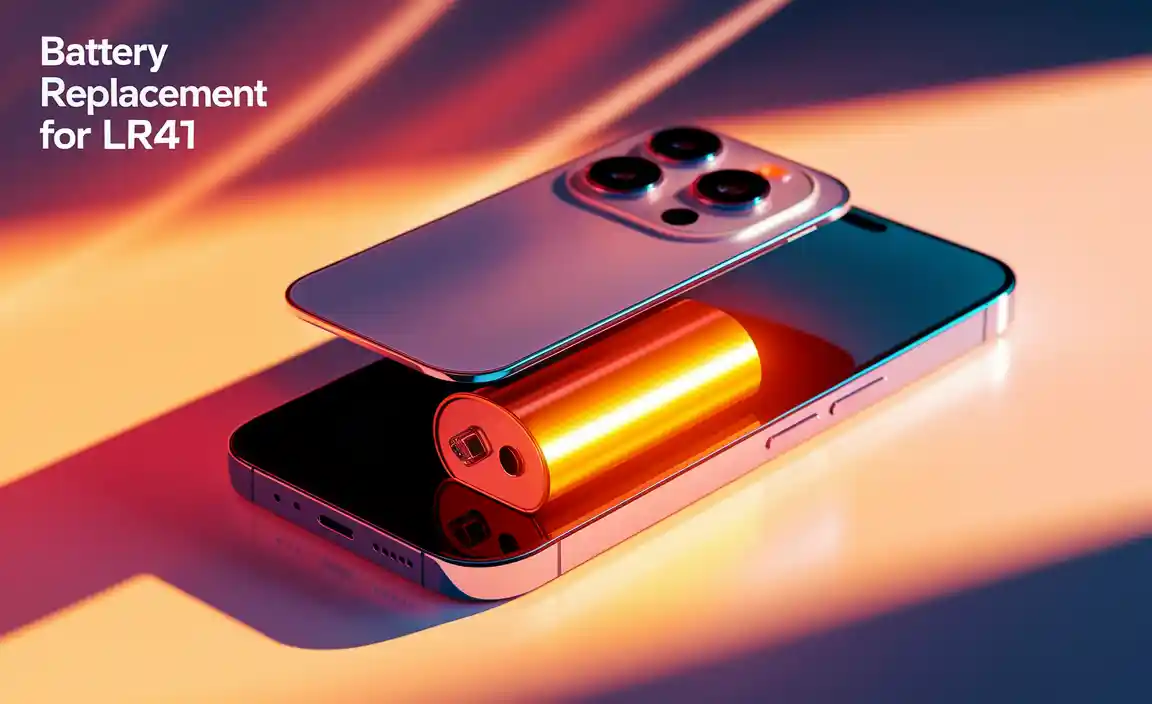For your Prius, the battery is the heart of its hybrid power, delivering essential energy for efficiency and performance. When it comes to replacing or understanding the battery for a Prius, choosing the right unit ensures continued reliability and optimized fuel savings. This guide makes it simple.
Hey there, fellow drivers! Roy Walker here. Ever feel a little uncertain about your car’s battery, especially with a hybrid like the Toyota Prius? It’s understandable! The battery is a crucial part of what makes a Prius so special – blending electric power with gasoline for amazing fuel economy. But when it’s time for a change, or you just want to know more, it can feel like a big mystery. Don’t worry, though! We’re going to break down everything you need to know about your Prius battery in a way that’s super easy to grasp. We’ll cover what it does, why it matters, and how to make sure you’re getting the best performance. Ready to get your Prius running smoothly and efficiently? Let’s dive in!
Understanding Your Prius Battery: More Than Just a Car Battery
Your Toyota Prius uses a special kind of battery compared to a traditional gasoline-only car. It’s not just one battery; a hybrid like the Prius has two: a small 12-volt battery (think of it like the one in a regular car for starting and powering electronics) and the much larger, high-voltage hybrid battery that powers the electric motor and helps with fuel efficiency.
The high-voltage battery is the star of the show. It’s what allows your Prius to drive on electric power alone at lower speeds, silently gliding through your neighborhood or easing you through stop-and-go traffic without burning a drop of gasoline. This battery recharges itself through regenerative braking (capturing energy when you slow down) and when the gasoline engine is running. This constant cycle is what gives the Prius its legendary fuel economy.
When people talk about a “Prius battery replacement,” they are almost always referring to the high-voltage hybrid battery. This is a significant component, and understanding its life and performance is key to keeping your Prius running at its best.
The Life Cycle of a Prius High-Voltage Battery
These advanced hybrid batteries are designed to last a long time, often for the lifespan of the vehicle. Toyota estimates their hybrid batteries can last for 100,000 to 200,000 miles or even longer, depending on driving habits and climate. They are built with robust technology to withstand many charge and discharge cycles.
However, like any battery, they don’t last forever. Several factors can influence how long your Prius battery will perform optimally:
- Climate: Extreme temperatures, both hot and cold, can put more stress on a battery.
- Driving Habits: Frequent short trips where the battery doesn’t have much chance to fully charge or discharge can impact its long-term health.
- Maintenance: Ensuring the hybrid system is kept in good working order, including proper cooling for the battery, is important.
Signs Your Prius Battery Might Need Attention
Most of the time, your Prius will alert you when its hybrid battery is getting weak. You might see some familiar warning lights on your dashboard. Here are a few common indicators:
- Hybrid System Warning Lights: These are often the first signs – lights that say “Hybrid System” or “Check Hybrid System.”
- Reduced Fuel Economy: If you notice your MPG isn’t what it used to be, and your gas mileage has dropped significantly, the battery might be working harder or less efficiently.
- Loss of Electric-Only Driving: The car might struggle to engage its electric-only mode, or it might switch to the gasoline engine more often than before.
- Strange Noises or Performance Issues: While less common, unusual sounds or a noticeable dip in acceleration could also point to battery trouble.
Choosing the Right Battery for a Prius: New vs. Reconditioned vs. Used
When it’s time to replace the high-voltage battery for a Prius, you’ll likely encounter a few options. Each has its pros and cons, and understanding them can help you make the best financial and performance decision for your car.
1. New OEM (Original Equipment Manufacturer) Batteries
This is typically the most expensive option. An OEM battery is one made by Toyota or a supplier specifically for your Prius model. They come with a factory warranty and are guaranteed to be compatible and meet Toyota’s performance standards.
- Pros: Highest quality, longest anticipated lifespan, full warranty, seamless integration.
- Cons: Most costly option.
2. Reconditioned Batteries
A reconditioned hybrid battery has had its internal cells tested, and any faulty modules are replaced. The remaining healthy modules are then reassembled. These batteries are often a good middle-ground option.
- Pros: Significantly less expensive than new OEM, can offer nearly new performance, usually come with a decent warranty.
- Cons: Lifespan might be shorter than a brand-new battery, quality can vary depending on the reconditioning company.
3. Used Batteries
These are batteries pulled from other Prius vehicles. They are the cheapest option but also the riskiest. You can get lucky and find a battery with plenty of life left, or you might end up with one that’s already near the end of its useful life.
- Pros: Lowest initial cost.
- Cons: Shortest anticipated lifespan, limited or no warranty, performance is unpredictable.
Important Note: Always ensure the battery you choose is compatible with your specific Prius model and year. Batteries can differ slightly between generations and trim levels.
Where to Get Your Prius Battery Replaced
Replacing a high-voltage hybrid battery is not a DIY job for most people. These batteries operate at extremely high voltages, posing a serious safety risk if not handled properly. It’s best to leave this to the professionals.
1. Dealerships
Toyota dealerships offer new OEM batteries and have technicians specifically trained to handle hybrid systems. This is usually the most expensive route, but it offers peace of mind and a factory warranty.
2. Independent Hybrid Specialists
Many independent auto shops now specialize in hybrid vehicles. They can often offer a choice of new, reconditioned, or sometimes even used batteries. These shops can be a great option for saving money while still getting expert service. Look for shops that not only replace batteries but also offer testing and repair services for hybrid systems.
3. Hybrid Battery Replacement Specialists
There are companies that focus solely on replacing hybrid batteries. Some even offer mobile services where they come to you. These companies often have competitive pricing and good warranties. Do your research and read reviews to find a reputable one.
When choosing a service provider, always ask about:
- The type of battery they offer (new, reconditioned, used).
- The warranty included with the battery and the installation.
- Their experience with Prius vehicles.
- The total cost, including parts and labor.
The 12-Volt Battery in Your Prius: Still Important!
Don’t forget the smaller 12-volt battery in your Prius! While it’s not the main hybrid power source, it’s essential for starting the car (yes, the gasoline engine still needs to start!), powering your lights, radio, and all the car’s electronic systems before the hybrid system fully engages.
The 12-volt battery in a Prius is often a different size and type than in a conventional car. It’s typically a smaller, sealed Absorption Glass Mat (AGM) battery. These are designed for the unique demands of a hybrid, fitting in often tight spaces and handling the regular power cycling.
Signs Your Prius 12-Volt Battery Needs Replacing
The symptoms for a failing 12-volt battery in a Prius are actually quite similar to a traditional car:
- Slow engine crank or the engine fails to start.
- Dim headlights or interior lights.
- Electrical issues: power windows working slowly, radio acting up.
- The car might show a battery warning light, or sometimes a “Check Engine” light.
- The hybrid warning lights might come on as the car’s computer gets confused by the low voltage.
Replacing the 12-Volt Prius Battery (DIY Friendly!)
Unlike the high-voltage battery, replacing the 12-volt battery in a Prius is often a manageable DIY task for beginners. It’s much like changing a battery in a regular car. The key is getting the correct replacement battery and knowing where it’s located. You can usually find its location in your owner’s manual; it’s often in the trunk or under the rear seat.
Tools You’ll Likely Need:
- New 12-volt AGM battery compatible with your Prius model.
- Socket wrench set with appropriate socket sizes (often 10mm and 12mm).
- Terminal cleaner or a wire brush.
- Safety gloves and eye protection.
- A small stool or kneeling pad (optional).
Step-by-Step Guide for 12-Volt Battery Replacement:
- Safety First: Ensure the car is parked on a level surface, the engine is off, and the parking brake is engaged. Wear your safety gear.
- Locate the Battery: Consult your owner’s manual. It’s usually in a compartment accessible from the trunk or rear seat area.
- Remove the Old Battery:
- First, disconnect the negative (-) terminal. This is usually marked with a black cover or a minus sign. Loosen the bolt with your wrench and carefully remove the cable. Tuck it away so it can’t accidentally touch the battery post.
- Next, disconnect the positive (+) terminal. This is usually red or marked with a plus sign. Loosen the bolt and remove the cable.
- Unbolt and remove the battery hold-down bracket.
- Carefully lift the old battery out. They can be heavy!
- Clean the Terminals: Use a wire brush or terminal cleaner to scrub both the battery cable terminals and the battery tray where the battery sits. This ensures a good connection.
- Install the New Battery:
- Place the new battery in the tray, making sure it’s oriented correctly.
- Reinstall the hold-down bracket and secure it.
- Connect the positive (+) terminal cable first. Tighten the bolt firmly but don’t overtighten.
- Connect the negative (-) terminal cable last. Tighten the bolt.
- Final Check: Ensure all connections are secure and the battery is firmly seated.
- Start Your Prius: Turn on the car. You may need to reset some settings, like your radio presets or clock. The hybrid system should now engage normally.
Recycle Your Old Battery: When you buy a new battery, most places will take your old one for recycling. This is important for environmental safety.
Battery Maintenance Tips for Longevity
Whether it’s the high-voltage hybrid battery or the 12-volt battery, a little care can go a long way in extending their life and ensuring your Prius performs as it should.
For the High-Voltage Prius Battery:
- Avoid Extreme Driving: While Priuses are built to handle various conditions, prolonged driving in extreme heat or cold can stress the battery. Parking in the shade when possible can help in hot weather.
- Regular Servicing: Ensure your Prius gets its recommended maintenance. This includes checking and cleaning the hybrid battery cooling system intake filters. A clogged filter can cause the battery to overheat, reducing its efficiency and lifespan. You can often find instructions on how to locate and clean these filters in your owner’s manual or online tutorials.
- Drive Normally: Avoid aggressive acceleration and hard braking whenever possible. Smooth driving is best for overall fuel economy and battery health.
For the 12-Volt Prius Battery:
- Keep Terminals Clean: Periodically inspect the 12-volt battery terminals for corrosion (a white or bluish powdery substance). Clean them with a wire brush and a baking soda/water paste if you see any.
- Ensure a Tight Fit: Make sure the battery is securely fastened in its tray. A loose battery can lead to connection problems and damage.
- Check Voltage (Advanced): If you’re comfortable with a multimeter, you can check the 12-volt battery’s resting voltage. A fully charged battery should read around 12.6 volts or higher. If it consistently reads below 12.4 volts, it might be nearing the end of its life.
Understanding Prius Battery Lifespans and Costs
It’s essential to set realistic expectations for battery life and replacement costs. The life of a hybrid battery can be quite variable, and the cost of replacement is a significant investment.
Typical Lifespan Expectations:
As mentioned, the high-voltage battery in a Prius is designed for longevity. Many owners report getting 150,000 miles or more out of their original battery. Some even reach 200,000-300,000 miles before needing a replacement.
The 12-volt battery, however, has a much shorter lifespan, typically ranging from 3 to 5 years, similar to conventional car batteries. Environmental factors and usage patterns can influence this. For instance, in hotter climates, the 12-volt battery might degrade faster.
Cost Estimates for Replacement:
Here’s a general idea of what you might expect for replacement costs. These numbers are approximate and can vary significantly by region, vehicle model, and choice of battery and service provider.
| Battery Type | Estimated Cost (Parts & Labor) | Typical Warranty | Where to Get It |
|---|---|---|---|
| New OEM High-Voltage Battery | $2,500 – $5,000+ | 3-5 years (Toyota warranty) | Toyota Dealership |
| Reconditioned High-Voltage Battery | $1,000 – $2,500 | 1-3 years (Varies by installer) | Independent Hybrid Specialists, Battery Companies |
| Used High-Voltage Battery | $500 – $1,500 | 30-90 days (Rarely longer) | Salvage Yards, Used Parts Dealers |
| New 12-Volt AGM Battery | $150 – $300 | 1-3 years (Manufacturer/retailer warranty) | Auto Parts Stores, Dealerships, Independent Shops |
It’s always wise to get multiple quotes before committing to a replacement, especially for the high-voltage battery. Companies like GreenTec Auto, for example, specialize in hybrid battery solutions and often provide detailed pricing and warranty information on their websites.
Maximizing Your Prius Battery’s Performance
Your Prius battery is engineered for efficiency. By understanding how it works and adopting good habits, you can help it provide peak performance for years to come.
Understanding Regenerative Braking:
This is a key feature of hybrids. When you take your foot off the accelerator or apply the brakes, the electric motor acts as a generator. It captures the kinetic energy that would normally be lost as heat through friction in traditional brakes and converts it back into electricity to recharge the hybrid battery. This means smoother driving and less wear on your brake pads!
Driving Habits That Help:
- Smooth Acceleration: Gently pressing the accelerator allows the electric motor to handle more of the initial load, preserving gasoline.
- Anticipate Stops: Looking ahead and coasting to a stop rather than braking hard lets regenerative braking do more of the work, recharging the battery more effectively.
- Maintain Even Speeds: On highways, a consistent speed utilizes the hybrid system most efficiently.
- Minimize Idling: If you have to wait, shutting off the engine can prevent unnecessary fuel consumption and allow the hybrid battery to manage power needs if accessories are on.
- Understand ECO Mode: Using your Prius’s ECO mode adjusts the vehicle’s throttle response and climate control to maximize fuel efficiency, which indirectly helps prolong the battery’s charge cycles.
The Role of Battery Cooling:
The high-voltage battery generates heat during operation. To prevent overheating and ensure longevity, the Prius has a sophisticated cooling system. This system involves fans and air filters designed to keep the battery at an optimal temperature. Regularly checking and cleaning the intake filters for this system, usually located near the battery pack itself (often under the rear seat or in the trunk), is crucial. A blocked filter can force the fans to work harder and might even cause the battery to overheat, leading to reduced performance or premature failure. You can typically find the location




